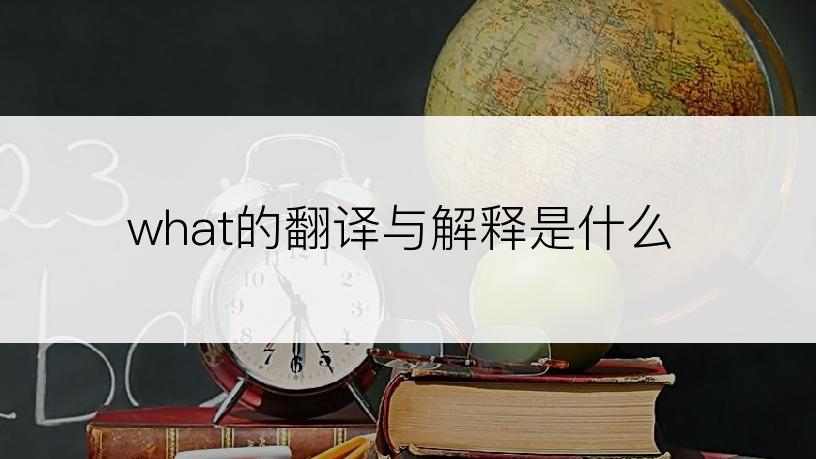what的翻译与解释是什么
发布于 2023-12-05 18:55:13
浏览 112

详情:
1、
what
2、
音标:英 [wɒt] 美 [wɑt]
3、
解析
4、
pron. 什么;多么;多少
5、
adj. 什么;多么;何等
6、
adv. 到什么程度,在哪一方面
7、
int. 什么;多么
8、
中文词源:
9、
what 什么来自PIE*kwo,印欧语疑问代词根,词源同who,where,why,how.
10、
英文词源:
11、
what
12、
what: [OE] What traces its history right back to Indo-European *qwod, which also produced Latin quod ‘what’. The Germanic descendant of this was *khwat, which has evolved into German was, Dutch wat, Swedish vad, Danish hvad, and English what.
13、
what (pron.)
14、
Old English hwæt, referring to things in abstraction; also "why, wherefore; indeed, surely, truly," from Proto-Germanic pronoun *hwat (cognates: Old Saxon hwat, Old Norse hvat, Danish hvad, Old Frisian hwet, Dutch wat, Old High German hwaz, German was, Gothic hva "what"), from PIE *kwod, neuter singular of *kwos "who" (see who). Corresponding to Latin quid.
15、
Meaning "what did you say?" is recorded from c. 1300. As an adjective and adverb, in Old English. As a conjunction in late Old English. Exclamatory use was in Old English. What the _____ (devil, etc.) as an exclamation of surprise is from late 14c. As an interrogative expletive at the end of sentences from 1891; common in affected British speech. Or what as an alternative end to a question is first attested 1766. What have you "anything else one can think of" is from 1925. What's up? "what is happening?" first recorded 1881.
16、
"To give one what for is to respond to his remonstrant what for? by further assault" [Weekley]. The phrase is attested from 1873; what for? as introducing a question is from 1760. To know what is what is from c. 1400; I'll tell you what to emphasize what is about to be said is in Shakespeare.
17、
双语例句:
18、
1. For what do we live, but to make sport for our neighbours, and laugh at them in our turn?
19、
我们活着是为了什么?不就是给邻居当笑柄,再反过来笑他们。
20、
来自《傲慢与偏见》
21、
2. Instead of complaining about what's wrong, be grateful for what's right.
22、
别抱怨不好的事,要对好的事心存感恩。
23、
来自金山词霸 每日一句
24、
3. A fellow doesn't last long on what he has done. He's got to keep on delivering as he goes along.--Carl Hubbell, Baseball Player
25、
靠过去完成的无法让人保有成功,必须在路上持续交出成绩。
26、
来自金山词霸 每日一句
27、
4. The difference between who you are and who you want to be is what you do.
28、
你是什么样的人和你想成为什么样的之间的差距就是,你做了什么。
29、
来自金山词霸 每日一句
30、
5. Remember, happiness doesn't depend upon who you are or what you have; it depends solely upon what you think.--Dale Carnegie
31、
请记住,幸福不在于你是谁或者你拥有什么,而仅仅取决于你的心态!
32、
来自金山词霸 每日一句
33、
更多相关例句:
34、
What do you want?...
35、
你想要什么?【柯林斯高阶英语词典】
36、
What did she tell you, anyway?...
37、
总之,她告诉了你什么?【柯林斯高阶英语词典】
38、
You can imagine what it would be like driving a car into a brick wall at 30 miles an hour...
39、
你可以想象汽车以每小时30英里的速度撞向一堵砖墙结果会怎样。【柯林斯高阶英语词典】
40、
I want to know what happened to Norman...
41、
我想知道诺曼怎么了。【柯林斯高阶英语词典】
42、
What precisely triggered off yesterday's riot is still unclear...
43、
究竟是什么引发了昨天的骚乱还不清楚。【柯林斯高阶英语词典】
44、
What I wanted, more than anything, was a few days' rest...
45、
我最想要的就是能休息几天。【柯林斯高阶英语词典】
46、
She had been in what doctors described as an irreversible vegetative state for five years...
47、
她处于医生所说的不可逆性植物人状态已经5年了。【柯林斯高阶英语词典】
48、
Meanwhile, most young people in the West are expected to leave what could be life's most momentous decision—marriage—almost entirely up to luck.
49、
同时,人们认为西方的大多数年轻人把婚姻这一可能是人生最重要的决定几乎完全交由命运来安排。【柯林斯高阶英语词典】
50、
He drinks what is left in his glass as if it were water...
51、
他把杯子里剩下的东西当水一样全喝了下去。【柯林斯高阶英语词典】
52、
He moved carefully over what remained of partition walls.
53、
他小心翼翼地跨过残余的隔墙。【柯林斯高阶英语词典】
54、
'Dad?' — 'What?' — 'Can I have the car tonight?'
55、
“爸爸?”——“什么事?”——“我今晚能用车吗?”【柯林斯高阶英语词典】
56、
'They could paint this place,' she said. 'What?' he asked.
57、
“他们可以粉刷这个地方,”她说。“什么?”他问。【柯林斯高阶英语词典】
58、
'Adolphus Kelling, I arrest you on a charge of trafficking in narcotics.'—'What?'
59、
“阿道弗斯·克林,我以贩毒的罪名逮捕你。”——“什么?”【柯林斯高阶英语词典】
60、
'We've got the car that killed Myra Moss.' — 'What!'
61、
“我们已经找到撞死迈拉·莫斯的车了。”——“真的!”【柯林斯高阶英语词典】
62、
What a horrible thing to do...
63、
做这样的事简直太可怕了!【柯林斯高阶英语词典】
64、
What a busy day.
65、
多么忙碌的一天啊。【柯林斯高阶英语词典】
66、
It's, what, eleven years or more since he's seen him...
67、
打从他上次见他,已有,嗯,11年甚至更久了。【柯林斯高阶英语词典】
68、
This piece is, what, about a half an hour long?
69、
这首曲子有,嗯,大约半个小时那么长,对吗?【柯林斯高阶英语词典】
70、
Guess what? I'm going to dinner at Mrs. Combley's tonight...
71、
你猜怎么着?今晚我要去康伯利夫人家里赴宴。【柯林斯高阶英语词典】
72、
Do you know what? I'm going to the circus this afternoon.
73、
你知道吗?我下午要去看马戏。【柯林斯高阶英语词典】
74、
Look at that moon. Is that beautiful or what?...
75、
看看那月亮,它真漂亮,不是吗?【柯林斯高阶英语词典】
76、
Am I wasting my time here, or what?
77、
我是在这儿浪费时间吗,是不是啊?【柯林斯高阶英语词典】
78、
'I skipped off school today,' — 'So what? What's so special about that?'...
79、
“我今天逃学了。”——“那又怎样?有什么特别的吗?”【柯林斯高阶英语词典】
80、
'This is Hollywood, U.S.A., where they make all the movies, remember.' — 'What of it?'...
81、
“记住,这是美国的好莱坞,所有那些影片都是在这里制作的。”——“那又如何?”【柯林斯高阶英语词典】
82、
Tell you what, let's stay here another day.
83、
我想,我们可以在这里再呆一天。【柯林斯高阶英语词典】
84、
What about going out with me tomorrow?...
85、
明天和我一起出去怎么样?【柯林斯高阶英语词典】
86、
'What about Sunday evening at Frank's?' — 'Sure. What time?'...
87、
“周日晚上在弗兰克家怎么样?”——“好啊,几点?”【柯林斯高阶英语词典】
88、
Now you've talked about work on daffodils, what about other commercially important flowers, like roses?...
89、
既然你们已谈到了种植水仙花,那么其他具有重要商业价值的花卉呢,比如玫瑰?【柯林斯高阶英语词典】
90、
And what about when you were in the fifth year, did people give you careers advice on coming to college?...
91、
那么在你五年级时,有人就上大学给过你择业方面的建议吗?【柯林斯高阶英语词典】
92、
'This thing with the Corbett woman.'—'Oh, yeah. What about her?'
93、
“是跟那个科比特家的女人有关的事。”——“哦,是吗,她怎么了?”【柯林斯高阶英语词典】
94、
Where are you in the cycle of renewal: Are you actively preserving the present, or selectively forgetting the past, or boldly creating the future? What advice would Leah give you to move you ahead on your journey? Once we're on the path of growth, we can continually move through the seasons of transformation and renewal.【出自-2017年6月阅读原文】
95、
When it's time to make the leap, they take action and immediately drop what's no longer serving their purpose.【出自-2017年6月阅读原文】
96、
What could have been considered the beginning of a descent is now a potential turning point—the turning point you are most equipped to take full advantage of.【出自-2017年6月阅读原文】
97、
What contributes to forgetting.【出自-2017年6月阅读原文】
98、
What Barth wrote decades ago is even truer today.【出自-2017年6月阅读原文】
99、
She is never sure what the final design will look like until the end.【出自-2017年6月阅读原文】
100、
Maybe some experience in their childhood meant that they became obsessed ( ' , 着迷) with calendars and what happened to them, says Patihis.【出自-2017年6月阅读原文】
101、
In search of a meaningful life, Leah gave up what she had and set up her own yoga studios.【出自-2017年6月阅读原文】
102、
I did what everybody else thought looked successful, she says.【出自-2017年6月阅读原文】
103、
I could imagine what the teacher was saying or what it looked like in the book.【出自-2017年6月阅读原文】
104、
Donohue, now a history teacher, agrees that it helped during certain parts of her education: I can definitely remember what I learned on certain days at school.【出自-2017年6月阅读原文】
105、
Ask Nima Veiseh what he was doing for any day in the past 15 years, however, and he will give you the details of the weather, what he was wearing, or even what side of the train he was sitting on his journey to work.【出自-2017年6月阅读原文】
106、
Apartments will retain their appeal for a while for Millennials, haunted by what happened to home-owning parents.【出自-2017年6月阅读原文】
107、
With Facebook she could keep her relatives up to date on what she was doing.【出自-2017年6月听力原文】
108、
What do animals do? There are three main ways that animals survive the cold in winter: sleep, adapt or migrate.【出自-2017年6月听力原文】
109、
He estimated that the comfort level will increase considerably in five to ten years3) One dog has been killed and multiple dogs have been injured by a snowmobile driver in what appears to be an intentional attack on competitors in the Iditarod Race in Alaska.【出自-2017年6月听力原文】
110、
may be better at solving puzzlescan memorize things with more easemay have greater facility in abstract reasoningcan put what they have learnt into more effective usefind ways to slow down our mental declinefind ways to boost our memoriesunderstand the complex process of mental functioningunderstand the relation between physical and mental healthThe most important thing in the news last week was the rising discussion in Nashville about the educational needs of children.【出自-2016年6月阅读原文】
111、
What people were like when they came in had greater consequence than what happened once they were there.【出自-2016年6月阅读原文】
112、
What matters, she added, is a combination of what people bring in with them, and what they find there.【出自-2016年6月阅读原文】
113、
What mattered most was the residents' physical health and mental status.【出自-2016年6月阅读原文】
114、
What kind of care facility old people live in may be less important than we think.【出自-2016年6月阅读原文】
115、
What government has not yet found is the political will to put that understanding into full practice with a sequence of smart schooling that provides the early foundation.【出自-2016年6月阅读原文】
116、
What does the author say about pre-kindergarten education?It should cater to the needs of individual children.【出自-2016年6月阅读原文】
117、
What about supply? The three environmental trends—the shortage of fresh water, the loss of topsoil and the rising temperatures—are making it increasingly hard to expand the world's grain supply fast enough to keep up with demand.【出自-2016年6月阅读原文】
118、
We all have our own ideas about what would bring our parents happiness.【出自-2016年6月阅读原文】
119、
These findings are in agreement with what you would expect from the evolutionary theory: those who like to make friends and help others can gather enough resources to make it through tough times.【出自-2016年6月阅读原文】
120、
The most difficult step in programming values will be deciding exactly what we believe is moral, and how to create a set of ethical rules.
上一篇:wharves的翻译与解释是什么
下一篇:whatchamacallit的翻译与解释是什么


